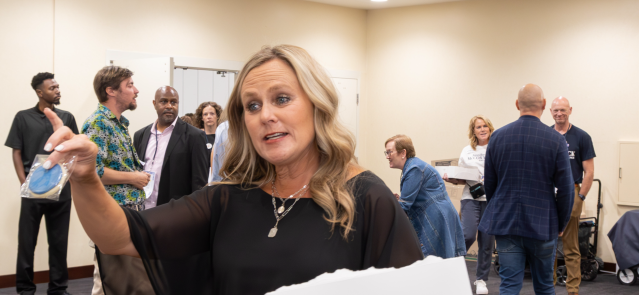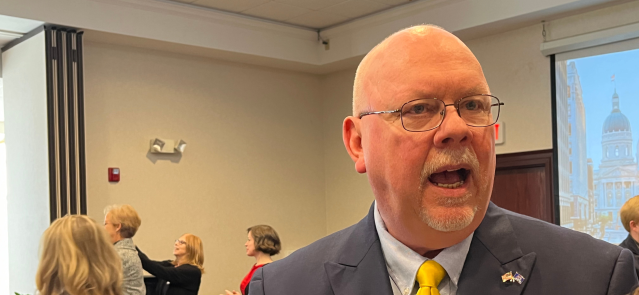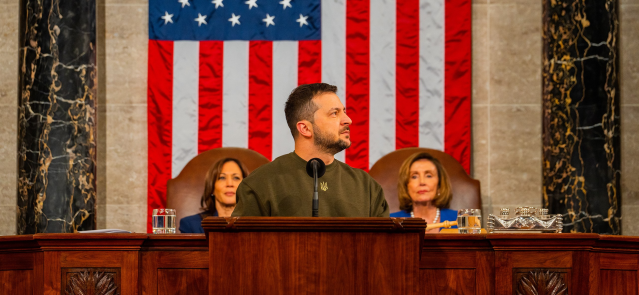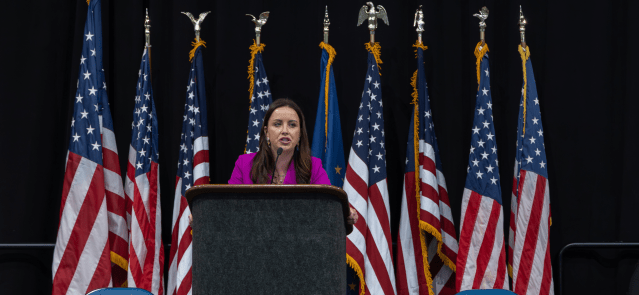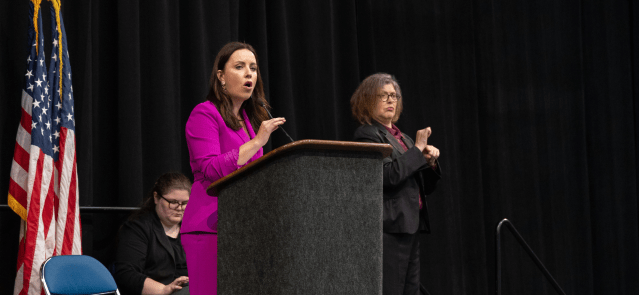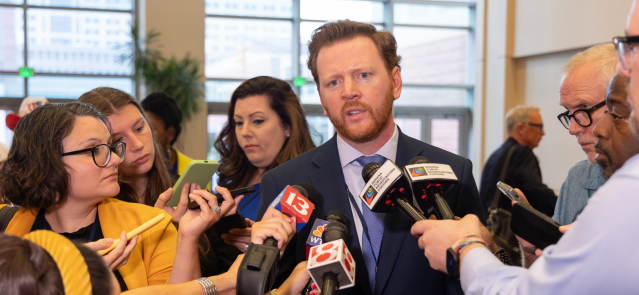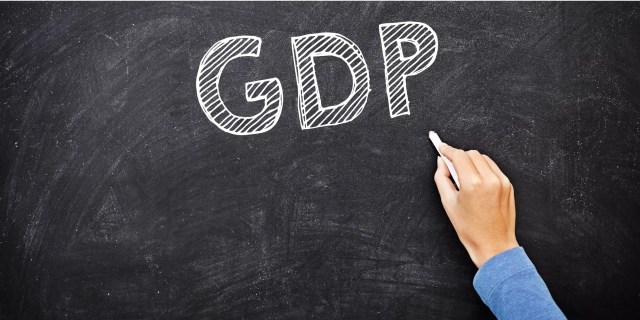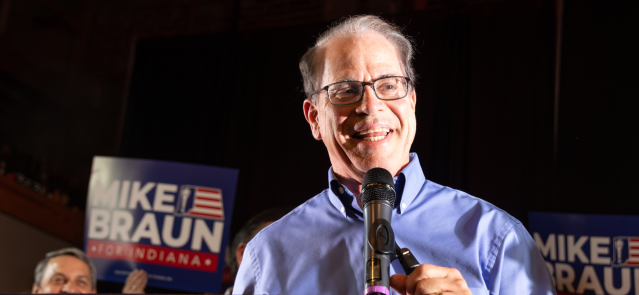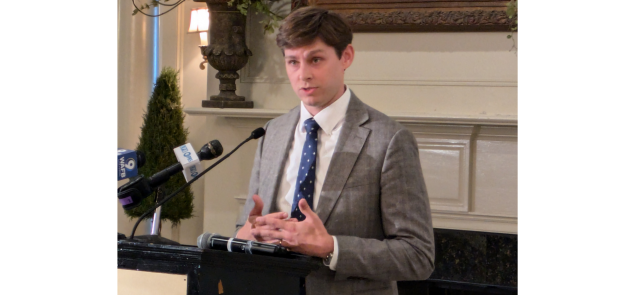NEW BUFFALO, Mich. — Where might Hoosiers gather these days for good times? How about a Friday-night high school football game or a Saturday-afternoon matchup at Assembly Hall or Mackey Arena? Church on Sunday morning? A potluck at Grandma’s that afternoon? Bingo at the Moose Lodge?
>> Related: Indiana marijuana legalization: Will 2025 be the year?
Or this, one of the dozens of cannabis dispensaries just miles (if not yards) away in Michigan, Illinois and, perhaps coming soon to Union City, Ohio.
Drive to Mile Marker 1 on Interstate 74 into Illinois and the first dispensary is just on the right. The parking lots are about 75% filled with Indiana-plated cars. Ditto for New Buffalo, where a half-dozen or so cannabis stores have already sprouted, with more under construction. On a recent weekend, these dispensaries were packed with Hoosiers waiting in lines for service. Driving up toward Michigan on I-69 in Steuben County is to be greeted with dozens of cannabis billboards heralding shops in Coldwater, California, Redding and Hillsdale.
In Niles, Hoosier consumers can drive into a parking lot and receive a paper menu and carhop services delivered right to their window. The Lunkquarium in Edwardsburg has been replaced by Dr. A’s Re-Leaf Center. There are the Dude Abides shops in Constantine and Sturgis. In Illinois, Windy City Cannabis is a short drive from Highland, Indiana, to Highwood, Illinois.
Indiana is a legal-cannabis island, with all surrounding states having legalized weed in some form. Even Kentucky will offer medicinal marijuana beginning in January. Marijuana has been easily attainable for decades on the Hoosier black market. Now Hoosiers are driving to neighboring states to purchase product under quality control that hasn’t been tainted by fentanyl.
In all, some 24 states, three U.S. territories and the District of Columbia have legalized recreational cannabis. Five states — Arkansas, Florida, Nebraska, North Dakota and South Dakota — have cannabis referendums on the November ballot.
But outside of Indianapolis, where prosecutors say they will no longer charge defendants for personal possession, an average of 10,000 Hoosiers annually have faced marijuana trafficking, dealing and possession charges. Thus, there’s a pot prohibition industry of cops, prosecutors, trial lawyers, jailers, probationers and urine testers who all have a straw in the action. Indiana has become a cannabis island because no one organized politically to compete against the prohibitionists.
I’ve attempted for years to find the true cost of marijuana prohibition to taxpayers and the workforce but haven’t had much success.
Last April, the Drug Enforcement Administration announced a proposal to reschedule cannabis (currently it is listed as a Schedule 1 drug, along with heroin and morphine). A hearing on the matter is scheduled for Dec. 2 in Washington.
In Ball State University’s 2023 Bowen Center Hoosier Survey, 54.2% of respondents selected, “It should be legal for personal use.” In comparison, 32.2% selected, “It should be legal for medicinal use.” Just 9.8% of respondents selected, “It should not be legal.” In an October 2022 Pew Research Center survey, 88% of U.S. adults said the drug should be legal, either for recreational and medical use (59%) or for medical use only (30%).
Earlier this month, Indiana crossed a political threshold when the Democratic nominee for governor, Jennifer McCormick, announced her “Commonsense Cannabis Legalization Plan.”
“Hoosiers have made it clear — they support adult-use cannabis and are frustrated by Indiana’s outdated prohibition laws,” McCormick said. “Our plan takes a commonsense approach by first introducing a well-regulated medical marijuana industry, allowing us to address potential regulatory challenges and ensure a smooth transition to well-regulated and legal adult-use cannabis.”
McCormick would establish an Indiana Cannabis Commission “responsible for overseeing the legal cannabis industry, including regulation, licensing and ensuring compliance with safety standards.”
She would immediately establish a medical marijuana industry. “This step will allow Indiana to address potential challenges and learn from the experiences of other states before moving to full adult use,” McCormick said.
McCormick added that legalizing adult-use cannabis could generate an estimated $172 million annually in tax revenues for Indiana, dollars that currently are headed out of state or off the books on the black market.
“Indiana is an island of prohibition surrounded by states with legal cannabis industries,” McCormick said. “By taking a responsible, phased approach, we can ensure that our state is prepared for full adult-use legalization while immediately providing relief through medical marijuana.”
Republican gubernatorial nominee Mike Braun appears to be open to dialogue on legalization.
“It’s inevitable,” he told WSBT-TV in May. “Now it’s reaching our own state. It’s been precipitated now to do something more quickly with what the feds have just decided.”
He told Fox59: “The fact is we are surrounded by four states. It’s going to hit all of us. I’m going to listen to law enforcement. They have to put up with the brunt of it. Medical marijuana, I think, is where the case is best made that maybe something needs to change, but I’ll take my cue from law enforcement there as well.”
As with past controversial issues, the people are well ahead of the politicians. In the 1980s, Republican General Assembly leaders refused to pass lottery referendum legislation lifting a constitutional ban. After the House speaker reelection upset in 1986, the General Assembly approved a lottery referendum for the 1988 election.
It passed with a resounding 62% of the vote.
Brian A. Howey is senior writer and columnist for Howey Politics Indiana/State Affairs. Find Howey on Facebook and X @hwypol.


